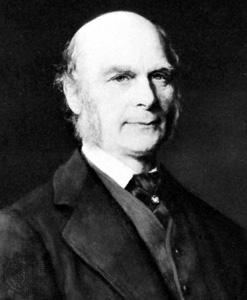Related Research Articles

Nature versus nurture is a long-standing debate in biology and society about the relative influence on human beings of their genetic inheritance (nature) and the environmental conditions of their development (nurture). The alliterative expression "nature and nurture" in English has been in use since at least the Elizabethan period and goes back to medieval French. The complementary combination of the two concepts is an ancient concept. Nature is what people think of as pre-wiring and is influenced by genetic inheritance and other biological factors. Nurture is generally taken as the influence of external factors after conception e.g. the product of exposure, experience and learning on an individual.
Twin studies are studies conducted on identical or fraternal twins. They aim to reveal the importance of environmental and genetic influences for traits, phenotypes, and disorders. Twin research is considered a key tool in behavioral genetics and in related fields, from biology to psychology. Twin studies are part of the broader methodology used in behavior genetics, which uses all data that are genetically informative – siblings studies, adoption studies, pedigree, etc. These studies have been used to track traits ranging from personal behavior to the presentation of severe mental illnesses such as schizophrenia.

Human behaviour genetics is an interdisciplinary subfield of behaviour genetics that studies the role of genetic and environmental influences on human behaviour. Classically, human behavioural geneticists have studied the inheritance of behavioural traits. The field was originally focused on determining the importance of genetic influences on human behaviour. It has evolved to address more complex questions such as: how important are genetic and/or environmental influences on various human behavioural traits; to what extent do the same genetic and/or environmental influences impact the overlap between human behavioural traits; how do genetic and/or environmental influences on behaviour change across development; and what environmental factors moderate the importance of genetic effects on human behaviour. The field is interdisciplinary, and draws from genetics, psychology, and statistics. Most recently, the field has moved into the area of statistical genetics, with many behavioural geneticists also involved in efforts to identify the specific genes involved in human behaviour, and to understand how the effects associated with these genes changes across time, and in conjunction with the environment.
Delbert Duane Thiessen is an American psychology professor emeritus whose research focused on evolutionary mechanisms of reproduction and social communication.
The Minnesota Center for Twin and Family Research is a series of behavioral genetic longitudinal studies of families with twin or adoptive offspring conducted by researchers at the University of Minnesota. It seeks to identify and characterize the genetic and environmental influences on the development of psychological traits.
Research on the heritability of IQ inquires into the degree of variation in IQ within a population that is due to genetic variation between individuals in that population. There has been significant controversy in the academic community about the heritability of IQ since research on the issue began in the late nineteenth century. Intelligence in the normal range is a polygenic trait, meaning that it is influenced by more than one gene, and in the case of intelligence at least 500 genes. Further, explaining the similarity in IQ of closely related persons requires careful study because environmental factors may be correlated with genetic factors.

Robert Joseph Plomin is an American/British psychologist and geneticist best known for his work in twin studies and behavior genetics. A Review of General Psychology survey, published in 2002, ranked Plomin as the 71st most cited psychologist of the 20th century. He is the author of several books on genetics and psychology.
The field of psychology has been greatly influenced by the study of genetics. Decades of research have demonstrated that both genetic and environmental factors play a role in a variety of behaviors in humans and animals. The genetic basis of aggression, however, remains poorly understood. Aggression is a multi-dimensional concept, but it can be generally defined as behavior that inflicts pain or harm on another.

Nancy L. Segal is an American evolutionary psychologist and behavioral geneticist, specializing in the study of twins. She is the Professor of Developmental Psychology and Director of the Twin Studies Center, at California State University, Fullerton. Segal was a recipient of the 2005 James Shields Award for Lifetime Contributions to Twin Research from the Behavior Genetics Association and International Society for Twin Studies.

Irving Isadore Gottesman was an American professor of psychology who devoted most of his career to the study of the genetics of schizophrenia. He wrote 17 books and more than 290 other publications, mostly on schizophrenia and behavioral genetics, and created the first academic program on behavioral genetics in the United States. He won awards such as the Hofheimer Prize for Research, the highest award from the American Psychiatric Association for psychiatric research. Lastly, Gottesman was a professor in the psychology department at the University of Minnesota, where he received his Ph.D.
Behavioural genetics, also referred to as behaviour genetics, is a field of scientific research that uses genetic methods to investigate the nature and origins of individual differences in behaviour. While the name "behavioural genetics" connotes a focus on genetic influences, the field broadly investigates the extent to which genetic and environmental factors influence individual differences, and the development of research designs that can remove the confounding of genes and environment. Behavioural genetics was founded as a scientific discipline by Francis Galton in the late 19th century, only to be discredited through association with eugenics movements before and during World War II. In the latter half of the 20th century, the field saw renewed prominence with research on inheritance of behaviour and mental illness in humans, as well as research on genetically informative model organisms through selective breeding and crosses. In the late 20th and early 21st centuries, technological advances in molecular genetics made it possible to measure and modify the genome directly. This led to major advances in model organism research and in human studies, leading to new scientific discoveries.

John C. DeFries is one of the world's leading behavior geneticists. His achievements include being President of the Behavior Genetics Association (1982–1983) and cofounder of the journal Behavior Genetics, as well as its co-editor (1970–1978). His awards include the Dobzhansky Award for Outstanding Research in Behavior Genetics, Consulting Editor of the Journal of Learning Disabilities (1987–2002) and fellowships in the International Academy for Research in Learning Disabilities, Association for Psychological Science, and the American Association for the Advancement of Science, Section J (Psychology).

Gerhard Andersson is a Swedish psychologist, psychotherapist and Professor of clinical psychology at Linköping University. He is also affiliated researcher at Karolinska Institutet. He was a co-recipient of the Nordic Medical Prize in 2014.

Mouna Esmaeilzadeh is an Iranian medical doctor, neuroscientist, entrepreneur and TV personality. She has a Ph.D. in neuroscience from Stockholm Brain Institute at Karolinska Institutet in Stockholm. Her expertise and know-how has been covered on Swedish national television where she's invited to talk about science, technology, neuroscience and investments/entrepreneurship. The previous secretary of the Nobel Committee Alf Lindberg, said that Esmaeilzadeh is one of the leading authorities within the "future of health". She was awarded the "MENSA award of the Year" as well as the "Fact-based Optimist of the Year Award" which was handed out in partnership with Google by Warp Institute, amongst many other awards and recognitions.

Gerald "Jerry" McClearn was an American behavior geneticist and professor emeritus of health and human development and biobehavioral health at the Pennsylvania State University.
Jenae M. Neiderhiser is an American behavior geneticist who is a Distinguished Professor of Psychology and Human Development and Family Studies at Pennsylvania State University, where she is also co-director of the Gene Environment Research Initiative.
Wendy Johnson is an American differential psychologist and professor of psychology at the University of Edinburgh. She holds the chair in Differential Development in the Department of Psychology and Centre for Cognitive Ageing and Cognitive Epidemiology at the University of Edinburgh.
The Swedish Twin Registry is a twin registry based at the Karolinska Institutet in Stockholm, Sweden. Originally established in the 1960s, it is the largest twin registry in the world. It is widely used for medical research, with about thirty active research projects using data from the study as of 2019. As of 2012, it contained a total of 194,000 twins, 75,000 of whom were of a known zygosity. In principle, it contains records of every twin born in Sweden since 1886.
Danuta Elizabeth Wasserman is a professor of psychiatry and suicidology at Karolinska Institutet in Sweden. She is a public mental health and medical educator. She is currently the President of the World Psychiatric Association (WPA).
Li Jingmei is a research scientist with a primary focal point on breast cancer research at the Genome Institute of Singapore (GIS) in the Laboratory of Women's Health and Genetics. Li’s research focuses on understanding the causes of cancer and preventing or early detection of cancer. Her personal mission is to improve the lives of women. Li is passionate about science communication, education, and promoting breast cancer awareness.
References
- ↑ Plomin, Robert; DeFries, John C.; McClearn, Gerald E. (2008-02-22). Behavioral Genetics. Macmillan. p. 81. ISBN 9781429205771.
- ↑ "Penn State to hold Gerald E. McClearn Memorial Symposium". Penn State University. 2017-04-07. Retrieved 2019-03-11.
- 1 2 3 "Nancy Pedersen". Karolinska Institute. Retrieved 2019-03-11.
- ↑ "SATSA - The Swedish Adoption/Twin Study of Aging". Karolinska Institutet. Retrieved 2019-03-11.
- ↑ Kolata, Gina (2006-08-31). "Live Long? Die Young? Answer Isn't Just in Genes". The New York Times. ISSN 0362-4331 . Retrieved 2019-03-11.
- ↑ Dell'Amore, Christine (2006-02-06). "Study: Twins also share Alzheimer's". UPI. Retrieved 2019-03-11.
- ↑ Max, Arthur (1990-04-29). "Confidence--Partly a Matter of Genetics". Los Angeles Times. ISSN 0458-3035 . Retrieved 2019-03-11.
- ↑ "Four announced for BHS Distinguished Achievement Hall of Fame". Brainerd Dispatch. 2014-08-22. Retrieved 2019-03-11.
- ↑ "MEB scientists among Highly Cited Researchers". Karolinska Institute. Retrieved 2019-03-11.